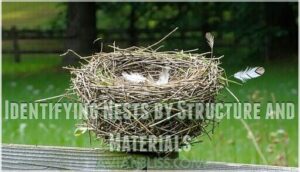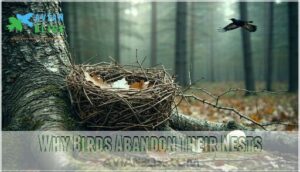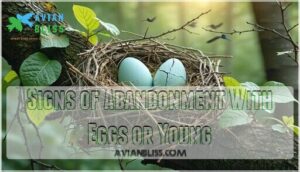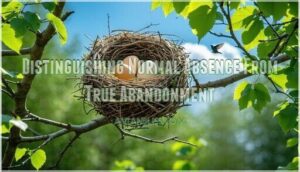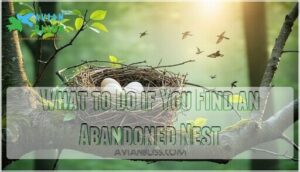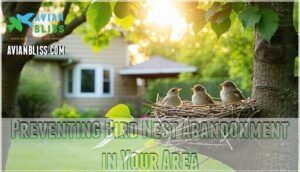This site is supported by our readers. We may earn a commission, at no cost to you, if you purchase through links.
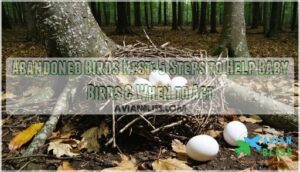
Most nests you’ll find during winter months aren’t actually abandoned—they’re simply old nests from previous breeding seasons, as parent birds rarely reuse the same structure.
True abandonment occurs when predator threats, human disturbance, severe weather, or parental death forces birds to flee their active nesting site.
You can confirm abandonment by monitoring for adult feeding behaviors during dawn and dusk, checking for cold eggs lasting over 48 hours, and observing nest deterioration without maintenance.
The key signs that separate normal foraging absences from genuine abandonment reveal vital timing differences that determine your next steps.
Table Of Contents
- Key Takeaways
- Where to Find Abandoned Bird Nests
- Why Birds Abandon Their Nests
- Identifying an Abandoned Bird’s Nest
- What to Do if You Find an Abandoned Nest
- Preventing Bird Nest Abandonment in Your Area
- Frequently Asked Questions (FAQs)
- Why do birds abandon their nests?
- Do birds abandon nests with eggs?
- Is a nest abandoned?
- Is nest abandonment permanent?
- What to do if you find an abandoned bird’s nest?
- Will birds return to an abandoned nest?
- Should I remove abandoned bird nest?
- How long does it take for a bird to abandon a nest?
- How long does it take for abandoned eggs to decompose?
- Can abandoned nests be safely removed and repurposed?
- Conclusion
Key Takeaways
- You’ll need to wait at least four weeks without seeing adult birds before confirming true abandonment, since parents often leave temporarily to forage and may only visit once daily during incubation.
- You can’t legally remove most bird nests without permits due to federal protection laws – contact wildlife rehabilitators or your state’s Department of Natural Resources for guidance before taking any action.
- You’ll identify genuine abandonment by monitoring for cold eggs lasting over 48 hours, complete absence of feeding behaviors during dawn/dusk, and visible nest deterioration without maintenance.
- You can prevent abandonment in your area by creating bird-friendly habitats with native plants, minimizing human and pet interference during nesting season, and maintaining pesticide-free environments that support natural food sources.
Where to Find Abandoned Bird Nests
You’ll discover abandoned bird nests most easily during winter months when bare trees reveal their hidden architecture in branch forks, cavity holes, and dense shrubs.
Winter’s bare branches become nature’s treasure map, revealing hidden architectural gems tucked in forgotten corners
Look for weathered structures made from twigs, mud, and feathers that survived harsh conditions—these durable nests indicate successful construction but lack recent parental activity.
Common Nest Locations in Nature
When exploring natural habitats, you’ll discover abandoned birds nest tucked into diverse nesting sites.
Tree cavities house woodpeckers and owls, while forest floors conceal ground-nesters like sparrows.
Bush habitats shelter thrushes in dense foliage.
Urban landscapes offer surprising bird nest types on building ledges and fire escapes, proving birds adapt resourcefully to available bird nesting materials.
Identifying Nests by Structure and Materials
You’ll discover the secrets of abandoned birds nest identification by examining three key structural elements.
Nest architecture reveals the builder’s identity through distinctive construction patterns and bird nesting materials selection.
- Nest shapes – Cup-shaped formations indicate songbirds, while platform structures suggest larger species like hawks
- Twig placement – Interwoven branches show skilled weavers, loose arrangements indicate ground nesters
- Nest foundations – Mud-lined bases reveal robin construction, while pure grass suggests sparrow craftsmanship
Bird nest architecture provides essential clues for species identification through these nest building techniques.
Seasonal Visibility and Signs of Abandonment
Most abandoned nests become visible during winter when bare branches reveal their secrets.
You’ll spot weathered structures that survived harsh conditions while ground nests disappear completely.
Nest Visibility increases dramatically after seasonal changes strip away foliage.
Look for deteriorated materials, absence of maintenance, and lack of bird behavior around the site.
Successful nest inspection reveals abandonment signs like scattered debris, exposed interiors, and complete absence of parental activity over extended monitoring periods, indicating abandonment signs, deteriorated materials, and absence of maintenance.
Why Birds Abandon Their Nests
You’ll discover that birds abandon their nests for several critical survival reasons, from predator threats to severe weather conditions.
Understanding these abandonment triggers helps you determine whether intervention is necessary or if the parents might still return.
Predator Threats and Perceived Danger
When predators lurk nearby, parent birds face a life-or-death decision that can spell doom for their entire brood.
Nature’s brutal calculus forces desperate parents to choose between current brood and future survival
Nest predators like snakes, raccoons, and cats trigger immediate threat response behaviors, forcing adults to abandon eggs or nestlings to safeguard their own survival.
Birds employ various survival tactics and predator avoidance strategies, but sometimes abandoning the nest becomes their only option for escaping bird attacks and protecting future breeding opportunities, which can be crucial for their future breeding.
Human Disturbance and Interference
Human activity disrupts nesting birds through proximity, noise, and handling attempts.
Your presence alone can trigger stress responses that lead parents to abandon their nests permanently.
- Noise pollution from traffic and construction doubles nest failure rates in songbirds
- Frequent visits (more than twice daily) increase abandonment cases by 43%
- Direct handling of nests results in desertion rates reaching 52% across species
- Chemical residues from human hands can deter parents from returning to feed young
Human Impact on bird nest abandonment reasons extends beyond physical disturbance.
Urban Planning often overlooks nest protection methods, while Conservation Efforts focus on reducing nest disturbance through education and habitat management strategies.
Environmental Factors and Extreme Weather
Severe storms and extreme weather patterns can devastate nesting sites, forcing birds to abandon their efforts.
Climate change intensifies these disruptions, creating unpredictable storm impacts that destroy carefully constructed homes.
Habitat loss from flooding, drought, or temperature extremes leaves parent birds with impossible choices.
When ecosystem disruption threatens survival, abandonment becomes nature’s harsh reality for protecting future generations.
Understanding the migration timing factors is essential in recognizing how birds respond to environmental changes, and how severe storms affect their behavior, making abandonment a last resort.
Parasitism and Nest Competition
Brood parasitism drives nest abandonment when species like Brown-headed Cowbirds invade host nests, forcing birds to reject foreign eggs or desert entirely.
Nest competition intensifies abandonment rates, with cavity-nesters facing aggressive takeovers.
Host species employ coevolution strategies, including rapid renesting and territorial nest defense, to counter these invasive threats and protect their reproductive success.
The survival of these species often depends on understanding nestbox competition to develop effective conservation methods.
Parental Death or Injury
Orphaned chicks face grim survival odds when parents die from predators or accidents.
Single-parent situations create overwhelming stress, often triggering nest abandonment reasons when remaining birds can’t provide adequate nestling care alone.
Critical impacts of parental loss:
- Starvation timeline – Injury impact means chicks get 50% fewer feeding visits, leading to death within 48-72 hours
- Temperature regulation failure – Fledgling survival drops dramatically without constant brooding from both parents
- Predator vulnerability increases – Unguarded nests become easy targets, explaining common nest abandonment signs
- Feeding schedule collapse – Bird parental care strategies require both adults; solo parents abandon to conserve energy
- Territory abandonment – Surviving parent may relocate, leaving nest behind as bird nest abandonment prevention instinct
Identifying an Abandoned Bird’s Nest
Determining whether a bird’s nest is truly abandoned requires careful observation of adult activity patterns over several weeks.
You’ll need to distinguish between normal parental absences for feeding and genuine abandonment, which typically becomes apparent after four weeks of no adult visits, indicating abandonment.
Monitoring Adult Bird Activity
Observe nest activity patterns during dawn and dusk when birds are most active.
Watch for consistent parental care behaviors like food delivery, egg turning, and protective positioning.
Adult birds typically visit nests every 15-30 minutes during peak feeding times.
Document these activity patterns over several days, noting any significant changes in frequency or duration that might indicate nest abandonment reasons, which can be crucial for understanding bird behavior and parental care.
Signs of Abandonment With Eggs or Young
Detecting abandonment becomes critical when eggs remain unhatched or nestlings appear motionless after extended periods.
Cold eggs and silent nests often signal parental absence, though immediate nest abandonment signs require careful evaluation before intervention.
Key abandonment indicators include:
- Egg Monitoring – Eggs remain cold for over 48 hours with no adult warming behavior during expected incubation periods
- Nest Inspection – Nestlings show no movement, begging responses, or growth over 24-48 hours despite normal fledgling behavior timelines
- Abandonment Signs – Complete absence of parental feeding, nest maintenance, or protective behaviors for extended observation periods
Nestling care patterns vary substantially between species, making abandonment research essential for accurate assessment before concluding nest abandonment causes require intervention.
Understanding baby bird falls is vital in evaluating the need for human intervention to guarantee the survival of the young birds.
Distinguishing Normal Absence From True Abandonment
How can you tell if parent birds have truly abandoned their young versus simply taking a necessary feeding break?
Understanding normal parental care patterns is essential for accurate nest monitoring. Adult birds naturally leave nests for extended periods during incubation, reducing nest activity to avoid attracting predators.
Bird behavior research shows abandonment signs include zero parental visits after four weeks of observation.
True nest abandonment causes concern only when combined with visible deterioration or unhatched eggs beyond normal incubation periods.
What to Do if You Find an Abandoned Nest
Finding an abandoned nest requires careful assessment before taking any action.
You’ll need to observe the nest for at least four weeks to confirm true abandonment, as adult birds often leave temporarily to forage or may only visit once daily during incubation periods.
Observation Period and Monitoring Techniques
Wait four weeks before concluding nest abandonment.
Monitor from a safe distance using binoculars to avoid disturbing potential returnees.
Document adult bird activity patterns daily during dawn and dusk feeding times.
Record nest condition changes, weather impacts, and predator presence.
Effective nest surveillance requires patience – brief parental absences don’t indicate abandonment.
Wildlife tracking reveals normal behavioral cycles during bird nesting seasons.
For the best viewing, invest in good bird watching equipment to enhance observations, which demands good equipment and effective surveillance to ensure successful bird watching.
Legal Considerations and Protected Species
Before removing any nest, you’ll navigate complex federal laws that protect most bird species.
The Migratory Bird Treaty Act shields over 1,000 species, making unauthorized nest handling illegal.
Key Legal Requirements:
- Federal Laws require permits for nest removal of protected species
- Species Protection extends to abandoned nests until breeding season ends
- Wildlife Permits are mandatory before any intervention with native birds
- Conservation Efforts depend on strict compliance with bird protection laws
- Legal Consequences include fines up to $15,000 per violation
Always verify protection status first.
Contacting Wildlife Rehabilitators for Guidance
Wildlife rehabilitators offer immediate phone guidance for nest emergencies.
Contact your state’s Department of Natural Resources or visit ahnow.org to locate certified Rehab Centers near you.
These Bird Rescue professionals provide specific instructions for temporary care while evaluating intervention needs.
Wildlife Help hotlines operate 24/7 for urgent situations.
Rehab Guidance includes proper containment methods and Nest Safety protocols.
Professional wildlife rehabilitation guarantees the best outcomes for bird conservation efforts when dealing with abandoned nest removal situations.
For emergency cases, to achieve the best results, follow proper baby bird care procedures.
Safe Handling Practices if Intervention is Necessary
Emergency care requires steady hands and proper technique. Never attempt bird rescue without wildlife permits or professional guidance.
Follow these intervention techniques:
- Wear gloves to prevent disease transmission
- Use a towel to gently secure the bird
- Place in a ventilated box lined with soft cloth
- Keep the environment warm and quiet
- Transport immediately to licensed rehabilitators
Abandoned nest removal should only occur after confirming true abandonment. Bird nest predators often cause false alarms, so proper assessment prevents unnecessary intervention.
Bird nest conservation depends on understanding when human help truly benefits wildlife versus causing additional stress. Understanding nest destruction laws is essential for effective conservation efforts.
Creating a Temporary Safe Environment
Creating a temporary safe environment requires careful planning when dealing with abandoned bird nests. You’ll need specific supplies and knowledge to provide emergency care while maintaining bird safety protocols.
| Supply Category | Essential Items | Purpose |
|---|---|---|
| Temporary Shelters | Small ventilated box, soft cloth lining | Provides secure nest protection environment |
| Temperature Control | Heating pad (low setting), thermometer | Maintains proper warmth for nestlings |
| Feeding Equipment | Syringes, appropriate formula, tweezers | Enables proper emergency care delivery |
| Safety Materials | Gloves, disinfectant, quiet location | Ensures wildlife preservation standards |
| Monitoring Tools | Timer, observation log, contact list | Tracks progress until professional help |
Position your makeshift shelter away from pets and noise. Keep temperatures between 85-90°F for most species. Never use cotton or terry cloth as nesting material.
When using a heating pad for temperature control, this is vital to understand proper heating pad safety.
Preventing Bird Nest Abandonment in Your Area
You can take proactive steps to create bird-friendly environments that reduce abandonment rates in your neighborhood.
Simple habitat modifications and thoughtful conservation practices help guarantee parent birds feel secure enough to successfully raise their young without fleeing from perceived threats, which can be achieved by implementing complete concepts of conservation.
Providing Suitable Nesting Habitats
Setting up quality bird nesting sites transforms your yard into a breeding haven.
Native plants like oak trees support 500+ insect species, providing essential protein for chicks.
Install nest boxes with proper entrance holes and drainage.
Offer natural nesting materials including twigs, moss, and feathers at various heights to attract diverse species and reduce abandonment rates.
Using proper nesting box designs can substantially enhance the nesting experience for birds, and provide them with a safe and healthy environment to raise their young, which is essential for creating a diverse species population and reducing abandonment rates.
Minimizing Human and Pet Interference
During nesting season, keep your distance from potential bird nesting sites to prevent abandonment caused by human impact.
Implement pet safety tips by restricting cats and dogs from areas with wildlife conservation value. Responsible ownership means leashing pets near known nest protection zones.
These simple measures substantially reduce nest abandonment signs and support bird nest protection methods for abandoned bird nests prevention, which is crucial for wildlife conservation.
Implementing Predator Control Measures
Strategic predator control safeguards vulnerable nests through proven deterrent methods.
Install nest guards around tree bases to prevent climbing predators, while motion-activated bird repellents discourage aerial threats.
Position protective fencing around ground-nesting areas, maintaining two-foot clearances for natural access.
Guard animals like domestic cats require indoor confinement during breeding seasons.
Effective predator avoidance combines multiple protection methods for thorough bird conservation efforts, ensuring thorough bird conservation.
Maintaining a Healthy Ecosystem for Birds
Beyond predator management lies ecosystem balance.
Diverse plantings increase insect prey by 70%, directly supporting nestling survival.
Pesticide-free landscaping preserves natural food webs essential for Wildlife Preservation and bird habitat preservation.
Building biodiversity support requires strategic planning:
- Plant native vegetation – Supports over 80% of local bird species with ideal Nesting Materials and shelter
- Maintain water sources – Doubles species richness when placed within 100 meters of nesting sites
- Preserve mature trees – Provides critical cavity sites for woodpeckers, owls, and hawks
Healthy soils with mycorrhizal fungi enhance bird-planted seedling growth by 50%, creating self-sustaining habitats that reduce abandoned bird nests through improved Ecosystem Balance and bird conservation efforts.
Educating Others on Bird Conservation Practices
Sharing bird conservation awareness with neighbors creates community-wide protection networks for nesting species.
You’ll amplify nest monitoring efforts through wildlife education programs and eco awareness initiatives that promote species preservation.
Effective bird conservation education programs, such as those using conservation techniques, can substantially reduce bird nest abandonment.
| Education Method | Conservation Impact |
|---|---|
| Community workshops on bird nesting habits | Reduces human disturbance during breeding seasons |
| Social media campaigns about abandoned bird nests | Increases reporting of bird nest abandonment cases |
| School programs on bird conservation practices | Develops long-term environmental stewardship |
| Neighborhood bird watching groups | Enhances local nest monitoring capabilities |
Frequently Asked Questions (FAQs)
Why do birds abandon their nests?
You’ll find birds abandon their nests when predators threaten, severe weather strikes, or human disturbance escalates stress levels.
Adult mortality, inadequate food sources, and excessive interference during incubation periods also trigger abandonment behaviors.
Do birds abandon nests with eggs?
Yes, birds do abandon nests with eggs, though it’s relatively uncommon.
You’ll see abandonment most often during incubation when stress factors like predators, severe weather, or human disturbance overwhelm parental instincts completely.
Is a nest abandoned?
You’ll know if birds have truly abandoned their nest by waiting four weeks after the last adult sighting, as parents often leave temporarily for feeding but return reliably.
Is nest abandonment permanent?
Like footprints left behind, nest abandonment isn’t always forever.
You’ll find that birds sometimes return to previously abandoned nests, especially if conditions improve or threats disappear, though most permanently relocate for better breeding success.
What to do if you find an abandoned bird’s nest?
Before taking action, observe from a distance to confirm the nest isn’t simply inactive between feeding cycles.
Wait four weeks after the last adult sighting before determining abandonment.
Contact local wildlife authorities—federal laws protect most bird nests.
Will birds return to an abandoned nest?
Birds rarely return to truly abandoned nests. Once breeding birds permanently leave their nest sites, they typically construct fresh nests for subsequent breeding attempts rather than reusing old structures.
Should I remove abandoned bird nest?
Don’t remove it yet! Wait four weeks from last adult sighting to confirm true abandonment. Federal law protects most bird nests, making removal without proper permits illegal and potentially costly.
How long does it take for a bird to abandon a nest?
Silence blankets the empty nest like morning fog, signaling nature’s harsh verdict.
You’ll typically wait four weeks from the last adult sighting before confirming abandonment, though incubation periods and species variations can extend this timeline considerably.
How long does it take for abandoned eggs to decompose?
Abandoned eggs typically decompose within 2-4 weeks, depending on temperature and humidity conditions.
You’ll notice the shell becomes brittle while internal contents break down through bacterial action, eventually leaving only fragments, which is a result of bacterial decomposition.
Can abandoned nests be safely removed and repurposed?
You can legally remove fully abandoned nests only after confirming complete inactivity and identifying non-protected species.
However, repurposing isn’t recommended since old nests may harbor parasites, diseases, or structural weaknesses that compromise safety.
Conclusion
Like a lighthouse guiding lost ships to safety, your knowledge about an abandoned birds nest becomes a beacon of hope for vulnerable wildlife.
Remember that timing remains critical—monitor for 48-72 hours before concluding true abandonment has occurred.
When you discover eggs or nestlings without parental care, contact licensed wildlife rehabilitators immediately rather than attempting rescue yourself.
Your careful observation and measured response can mean the difference between life and death for these defenseless creatures seeking survival.
- https://abcbirds.org/article/new-study-says-stress-from-human-activity-can-cause-urban-birds-to-abandon-nests-ten-times-more-often/
- https://www.green-feathers.co.uk/blogs/news/abandoned-birds-nest
- https://www.conservationevidence.com/actions/401
- https://nsojournals.onlinelibrary.wiley.com/doi/10.1111/jav.02418
- https://nestwatch.org/learn/how-to-nestwatch/faqs/i-havent-seen-an-adult-bird-in-a-while-is-the-nest-abandoned/


